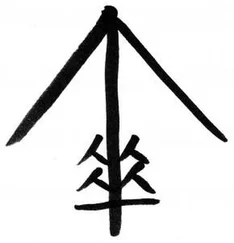The bell tolls nine times, indicating the end of morning lessons. The staff of the temple, including me, assume our positions. The temple is open to the public today, and the abbot, Master Deta, will be greeting a group of VIP faithful from the Internet industry and conducting a salon to discuss the connections between Buddhist doctrine and the web.
My assigned job is to hand out the visitor’s badges. On the list of VIPs, I see more than a few familiar names, including Mr. Wan.
Though it’s thirty-eight degrees Celsius, I put on my cotton medical face mask. Sweat pours off me as though I’m drenched by rain.
100.
The faithful, now dressed in the yellow robes and yellow shoes normally reserved for monks, stream in one after another, their colorful badges swaying on lanyards before their chests. For a moment I suffer the illusion of having returned to my old life from a few months ago: the China National Convention Center, JW Marriott Beijing, 798 D Park…. I was either at meetings or on my way to meetings, handing out my business card, adding people’s WeChat IDs, puffing up our clients, sketching incredible visions, peppering my speech with “Internet thinking” buzzwords—like some updated version of a Red Guard clutching his Little Red Book.
The faces before me are still the same, but now their badges have been stripped of the eye-catching titles. “CXO,” “Cofounder,” and “VP of Investment” have been replaced by “Householder,” “Believer,” and “Benefactor.” At least for the moment, they’ve retracted their typical arrogance and protruding bellies. Mumbling mantras, they take their seats and piously hand their phones, iPads, Google Glasses, smart wristbands, and so on to the waiting novice monks in exchange for a numbered ticket.
I see Mr. Wan. His face looks pallid and thin, but his gaze is steady and his steps airy. Placidly, he places the palms of his hands together and bows to the guests on either side of him, showing no trace of his former domineering air. As he passes me, I lower my head, and he lowers his in turn to acknowledge my greeting.
Many things must have happened in the intervening months.
Supposedly, Master Deta had once been a promising student at the Computer Science Department of Tsinghua University. However, as a result of his enlightenment, he gave up offers for graduate study at Stanford, Yale, UC Berkley, and other ivy-clad campuses, took up vows, and became ordained as a monk. With him as an example, a group of other graduates of elite colleges also joined our temple and began to spread the teachings of Buddhism online, bringing relief to all mortal beings with methods adapted to the Internet age.
The master’s lecture today roams over many subjects—so many that I barely remember any of them. I do see Mr. Wan holding a pious pose and nodding frequently. When the master discusses how big data techniques could be used to help locate the young reincarnations of tulkus, his eyes even grow tearful.
I’m trying to hide from him, but I also can’t suppress the urge to go up to him and ask if the storm has finally blown over. I don’t miss my old life, but I miss my family.
Here, only monks who have achieved a certain status have the right to use the Internet. The layered green branches of the ancient cypress grove, like a firewall, separate us from the noise and dust of the secular world. My daily life, however, is not boring at all: sweeping, working, chanting, debating, and copying. Uncluttered by material possessions, I’ve been sleeping without trouble for the first time in years, and no longer live in constant dread of sudden vibrations from my phone—though occasionally my right quadriceps still suffers phantom pulses. But my teacher tells me that if I count my prayer beads—all one thousand and eight hundred of them—every day for a hundred eighty days, I shall be fully cured.
I think it’s because we want too much, more than what our bodies and minds are designed to withstand.
My old job was all about creating need, encouraging people to pursue things that didn’t matter for their lives, and then I used the money they gave in exchange to purchase illusions others had created for me. Round after round, we never seemed to tire of the game.
I think about my wife’s words: Her son is such a pushover he might as well be a baby. Fuck, I’m even more useless than a baby.
This is my sin, my bad karma, the blockage I need to clear for my progress.
I’m starting to understand Mr. Wan.
After the lecture, Mr. Wan and a few others surround Master Deta, apparently because they have many questions that need his insight. Master Deta beckons to me. I gird myself and walk over.
“Would you bring these honored guests to meditation room three? I’ll be over in a moment.”
I nod, and lead the group to the room in the back reserved for VIPs.
I ask them to sit, and I pour tea for everyone. They nod and smile at each other, but their conversation is restricted to small talk. I’m guessing that they are competitors outside the temple.
Mr. Wan doesn’t look at me directly. He sips his tea and closes his eyes, meditating. His lips move as he silently recites some mantra, and his hands are busy with a string of rosewood prayer beads. After the forty-ninth time through the beads, I can’t hold myself back any longer. I walk up to him, bend down, and whisper next to his ear, “Do you remember me?”
Mr. Wan opens his eyes and scrutinizes me for half a minute. “You are Zhou….”
“Zhou Chongbo. You have an excellent memory, sir.”
Mr. Wan grimaces and lunges at me, wrapping the string of prayer beads about my neck and pushing me to the floor.
“You fucking idiot!” He curses and strikes me. The two guests next to him stand up, startled, but they don’t dare to intervene. “Amitabha. Amitabha,” they murmur.
I protect my face with my hands, but I don’t know what to say. “Mercy!” I cry. “Mercy!”
“Stop!” Master Deta’s voice booms. “This is a sanctified place! Such violence has no place here.”
Mr. Wan’s fist, suspended in midair, stops. He stares at me, and tears suddenly spill from his eyes and fall onto my face, as though he’s the one wronged.
“All gone…. I’ve lost everything… ,” he murmurs. Then he falls back into his seat.
I get up. I guess someone who’s lost everything can’t even strike very hard. My body isn’t hurting at all.
“Amitabha.” I put my palms together and bow to him. I know he’s not feeling much better compared to me. Just as I’m about to leave the meditation room, the abbot stops me, and strikes me with his ferule: twice on the left shoulder, once on the right.
“Don’t discuss what happened today with others. You still have too much worldly arrogance about you and cannot handle important tasks. You must study harder and reflect on your actions.”
I’m about to argue the point, but then remember that I once tolerated much worse from Lao Xu and Mr. Wan. Master Deta is basically the temple’s CEO. I have to swallow my pride.
I bow to him and back out.
I lean against the wall of the gallery and watch the woods in the setting sun. Smog glistens above the city like the piled layers of a sari. The bell tolls on the hour, and startled birds take to the air.
A thought flashes through my mind. I am reminded of how Master Subhuti once struck Monkey three times on the head with a ferule and then walked away with his hands held behind him, which was a message for Monkey to come to the back door of the master’s bedroom at the hour of the third watch for special lessons.
But how am I supposed to interpret two strikes on the left shoulder and one on the right?
101.
At around nine o’clock at night—that’s when first watch turns to second watch under the ancient time system—I head for the abbot’s chambers via backwoods trails. My journey through the dark woods is accompanied only by the gentle susurration of pines, with not even a chirp from a bird.
Читать дальше












